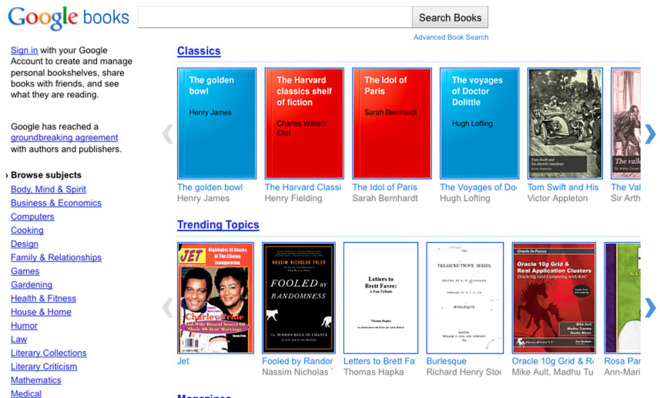No, Google isn't evil for scanning millions of books
The infamous Google Books copyright trial reaches an end

A free daily email with the biggest news stories of the day – and the best features from TheWeek.com
You are now subscribed
Your newsletter sign-up was successful
Google scored a big victory Thursday when a federal judge in New York dismissed a copyright lawsuit brought against the company eight years ago.
The case involves a project near and dear to the hearts of many literature lovers and academics: Google Books, an ambitious attempt to digitize tens of millions of books for readers to enjoy online.
The case goes back to 2004, when Google began scanning hundreds of millions of pages from research institutions and libraries without the express permission of publishers. Eventually those partnerships extended to Harvard University and the New York Public Library.
The Week
Escape your echo chamber. Get the facts behind the news, plus analysis from multiple perspectives.

Sign up for The Week's Free Newsletters
From our morning news briefing to a weekly Good News Newsletter, get the best of The Week delivered directly to your inbox.
From our morning news briefing to a weekly Good News Newsletter, get the best of The Week delivered directly to your inbox.
How does it work in practice? Imagine you wanted to read The Adventures of Huckleberry Finn. If the book is out of copyright, or if the author has granted Google permission, anyone with a computer can read the book in its entirety. For other works, Google displays an incomplete preview with a link to purchase it, or makes the book inaccessible, if the author so wishes.
The initial blowback from rattled publishers and authors was fierce but largely expected. And the battle raised important questions about fair use and copyright: Was the Google Books project transformative? Did it serve the public good? Or did it merely serve the financial interests of a publicly traded company?
In 2005, groups representing the authors and publishers sued Google for proceeding with the scans without permission. A $125 million settlement was reached years later, but Judge Denny Chin of the United States Court of Appeals for the Second Circuit rejected it in 2011, and the case was at a standstill.
The authors and publishers soon splintered off, and Google eventually reached an undisclosed settlement with the latter group.
A free daily email with the biggest news stories of the day – and the best features from TheWeek.com
Which brings us to the ruling today, which concerns Google vs. the Authors Guild Inc. From Judge Chin's opinion:
In my view, Google Books provides significant public benefits. It advances the progress of the arts and sciences,while maintaining respectful consideration for the rights of authors and other creative individuals, and without adversely impacting the rights of copyright holders. It has become an invaluable research tool that permits students, teachers, librarians, and others to more efficiently identify and locate books. It has given scholars the ability, for the first time, to conduct full-text searches of tens of millions of books. It preserves books, in particular out-of-print and old books that have been forgotten in the bowels of libraries, and it gives them new life. It facilitates access to books for print-disabled and remote or underserved populations. It generates new audience sand creates new sources of income for authors and publishers. Indeed, all society benefits. [Scribd, via CNET]
The Authors Guild plans to appeal the decision, and issued this response:
"We disagree with and are disappointed by the court's decision today," Authors Guild executive director Paul Aiken said. "This case presents a fundamental challenge to copyright that merits review by a higher court. Google made unauthorized digital editions of nearly all of the world's valuable copyright-protected literature and profits from displaying those works. In our view, such mass digitization and exploitation far exceeds the bounds of fair use defense." [Author's Guild]
But Google is now free to expand its growing library, which is at 20 million books and counting. And whether the king of search makes money from the Google Books program is almost beside the point.
This isn't just a major legal hurdle cleared for Google. It's a big win for academic researchers. It's a big win for libraries and their collections left gathering dust. It's a big win for readers hampered by the limitations of their geography, and anyone who believes the human race is better served when knowledge isn't fenced in.
While some would argue that stepping over lesser-funded publishers is "Evil Google" rearing its ugly head, I'd argue the opposite to be true: This is "Good Google" — the one that brought us Search and Maps and wants to make the world's information available for all — at its best.
-
 The Olympic timekeepers keeping the Games on track
The Olympic timekeepers keeping the Games on trackUnder the Radar Swiss watchmaking giant Omega has been at the finish line of every Olympic Games for nearly 100 years
-
 Will increasing tensions with Iran boil over into war?
Will increasing tensions with Iran boil over into war?Today’s Big Question President Donald Trump has recently been threatening the country
-
 Corruption: The spy sheikh and the president
Corruption: The spy sheikh and the presidentFeature Trump is at the center of another scandal